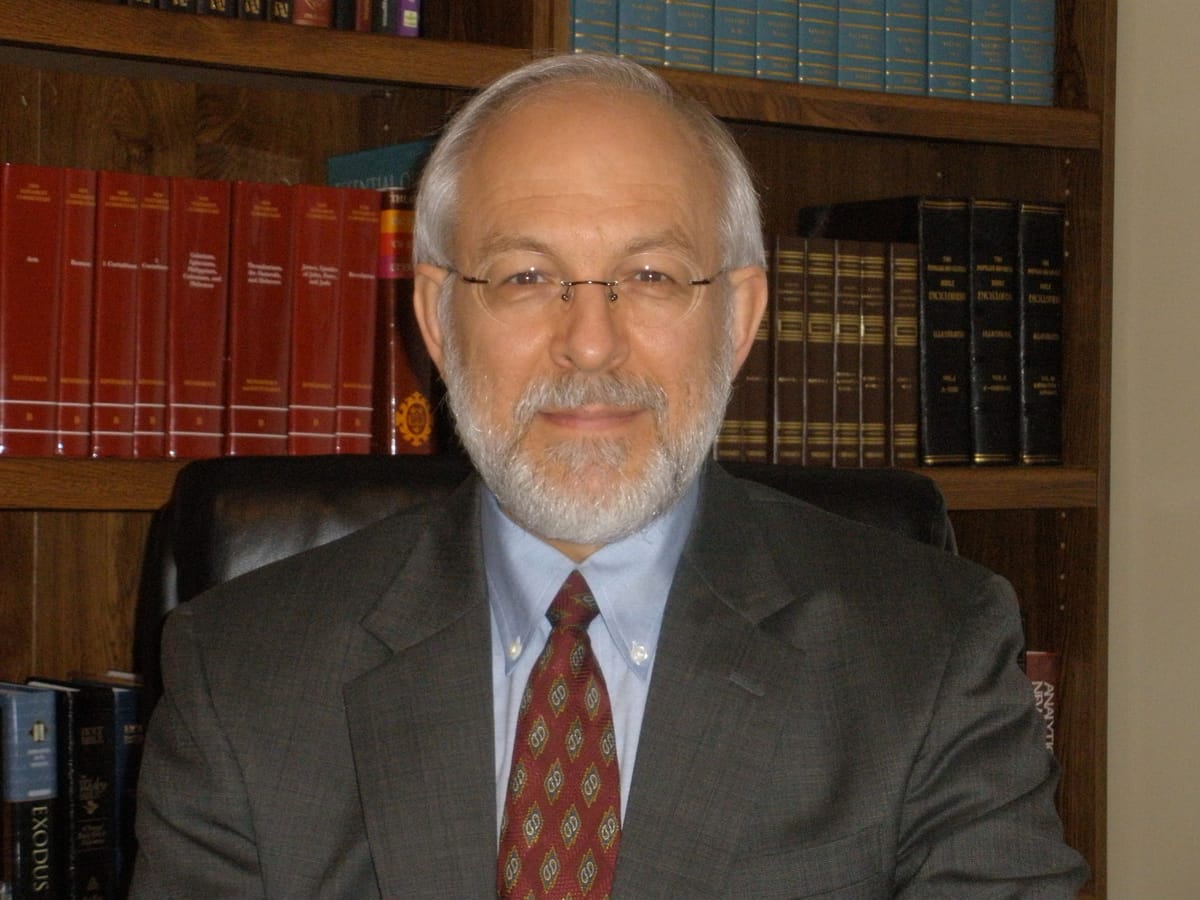Chapter 2, Section 5: Plenary and Verbal vs. Conceptual Inspiration (cont'd)
Plenary inspiration not only means that every word is inspired, but that every letter of every word is inspired and therefore of utmost importance. We know this to be true because Jesus Himself stated this:
Matthew 5:18 For verily I say unto you, Till heaven and earth pass, one jot or one tittle shall in no wise pass from the law, till all be fulfilled.
In English we would say, “Not one dot over an ‘i’ or the crossing of a ‘t’ will pass away…” so certainly if every part of a letter is going to be there, every letter is going to be there. In his epistle to the Galatians, the apostle Paul based an entire argument on the use of a word in the singular as opposed to the plural:
Galatians 3:16 Now to Abraham and his seed were the promises made. He saith not, And to seeds, as of many; but as of one, And to thy seed, which is Christ.
There are at least—and this is not an exaggeration—120 other verses that demonstrate that Yahweh places His emphasis on His very words, not merely His concepts and ideas. If you are interested in searching out this for yourself, take a Strong’s or Young’s Concordance and look up the word “word” or “words,” and you will find dozens and dozens of places to satisfy your search.
The opponents of verbal inspiration do raise some objections which must be considered. However, most of the objections appear to center on the supposition that there are textual errors, seeming discrepancies, and allegedly incorrect or misapplied quotations.
In other words, they are referring to someone in the New Testament quoting a verse from the Old Testament where it does not quite match up. The critics say that these are all errors; therefore, these must not be verbally inspired. In this way, they allow those seeming discrepancies and alleged errors stand in the way of accepting the complete verbal and plenary inspiration of Scripture.
But once again, this goes back to our heart attitude towards the Word of God. In the case of a prideful and arrogant man accepting the plain teachings of the Bible about its own verbal inspiration, this man wants to determine for himself the extent to which the Bible is inspired.
This is essentially the position of those who, a century or two ago, were called the Rationalists—those who elevate human reason. In short, it is pride and rebellion. Instead, our attitude should be that we would accept the teaching of the Bible as final on this point. Then we can seek solutions for the textual problems, which solutions would be consistent with the clear teaching of the Bible’s inspiration.
If we do not get all of the answers to clear up all of the alleged discrepancies and errors as quickly as we would like, then we can reveal our faith by waiting patiently until Holy Spirit grants us more light. Instead of pride and rebellion, our attitude should be one, at the very least, of humbly granting God and His Word the benefit of the doubt.
Is that not what we are really doing when we enter our Christian walk? Or do we assume the attitude of “I am not going to believe this Book until I have gone through it, fine-toothed combed it, and proved everything that seems to be wrong.”?
Think about that. If that is your attitude, then you will never arrive at your destination. However, if you begin with the attitude of humbly seeking the truth of the Bible, and you believe what you read, then God will use His Spirit to lead you into all truth.
Multitudes of books deal with alleged Bible discrepancies and contradictions. A man named Kenneth Kantzer put it well in one of these books when he wrote, “Evangelicals [substitute “Bible-believing Christians”] do not try to prove that the Bible has no mistakes so that they can be sure that the Bible is the Word of God. One might prove that a newspaper article is free from all mistakes, but that would not prove that the newspaper article is the Word of God, would it?”
Further, he says, “The evangelical considers it unreasonable for anyone to demand that he must be able to demonstrate the complete harmony of all Bible passages before he can reasonably accept them as true.” So what will our heart attitude be toward the Bible? There are only two choices: humility or pride.
The notion of plenary and verbal inspiration is inextricably interwoven with the doctrine of the inerrancy and infallibility of Scripture. As we enter into this portion of the discussion, let me proffer an opinion: I believe that all down through the centuries of Christianity, there have been at least three classes of people.
There have been those whose faith and trust in Christ and the Scriptures has been strong and unassailable, unshakeable. On the opposite side, but still within the ranks of professing Christianity, have been those who are described in the Bible as “certain men crept in unawares.” In other words, there have been men who have infiltrated the church pretending to be Christians for the specific purpose of destroying the faith of as many Christians as they can.
These enemies have often pretended to be the most pious so that they might be able to lead astray many souls with their false doctrines. We could suggest a number of these infiltrators by name even today, but that is not the purpose of this study.
Then there is a third group of Christians, a much larger group all down through the centuries, who are searching and struggling to attain to the faith and trust that they see possessed by those in the first group. To put it in simplistic terms, there are the good guys, there are the bad guys, and there is the vast majority in the middle, all within the umbrella of professing Christianity. These people in the middle are the target of both groups. They both want to win the middle group over.
It happens that in the process, many in the middle who are preachers, teachers, and writers sometimes teach one doctrine for a while and then later, by the grace of God, they see their previous error, and they are not afraid to change their teachings to fit the new light that they have been given.
Focusing now on this same process as it applies to the doctrine of biblical inerrancy and infallibility. I believe that the current battle, and by current I mean the past one or two hundred years, over biblical inerrancy and infallibility is one which manifests these same three groups of professing Christians.
The enemies of Christ are very actively at work today in trying to capture the minds and hearts of men and women by casting doubt on the truth and reliability of the written Word of God.
One of the many ways they do this is by claiming, “Well, yes, the Bible is infallible, but it is not inerrant.” You might ask, “How do they distinguish between the two?” They do it by limiting its infallibility to certain areas.
They say the Bible is merely an infallible guide in matters of “faith and practice,” and what they mean by that term is that the Bible’s truth is limited to so-called spiritual matters. When I profess to believe that the Bible is my infallible guide in all matters of faith and practice, it means everything—my whole walk (manner of life), not just the spiritual side.
They say that the Bible’s infallibility is limited to spiritual matters, and that there may errors in the Bible in the areas of science, geography, history, astronomy, or biology, etc. That is the position of those that call themselves “neo-evangelicals.”
This is a very destructive teaching. However, this is not to say that everyone who calls himself a neo-evangelical or who holds the neo-evangelical position is an infiltrating agent. Some of them may be “group two” people (the group in the middle) who are honestly mistaken, and hopefully they will be led by God to see the ultimate self-contradiction in their position.
The neo-evangelical position contends that the purpose of Scripture is to lead men to salvation and that any other subject that the Scripture writer might mention, such as geography or astronomy or agronomy is incidental to the main purpose of the Bible writer.
Therefore, he could have been in error on those subjects, not that the Bible writer intentionally meant to deceive any reader, but his knowledge may have been insufficient in these areas, or he may have been trying to accommodate his writing to the generally accepted truth of the day.
Of course, in our enlightened scientific age, the neo-evangelical continues, we have found that they were all wrong. For example, in the gospel of Matthew, Matthew pens a parable in which he states that the mustard seed is the least of all seeds:
Matthew 13:31 Another parable put he forth unto them, saying, The kingdom of heaven is like to a grain of mustard seed, which a man took, and sowed in his field:
32 Which indeed is the least of all seeds: but when it is grown, it is the greatest among herbs, and becometh a tree, so that the birds of the air come and lodge in the branches thereof.
We do know that there are many other of seeds that are smaller, the orchid seed for instance. The neo-evangelical says, “Well, Jesus was trying to get across the salvation message to His hearers, and that is what is really important.”
There is a big problem with this thinking. These are not just the words of the Bible writer, Matthew; these are the words of Christ Himself. If we believe that Christ is God, and it is axiomatic that God cannot tell a lie, then we have a major discrepancy.
It appears on the surface that Jesus fudged on this one. It is not just a matter of the human author being ignorant of the science of agronomy or botany, what we have here is an alleged instance of God Himself, in the flesh of Jesus, being ignorant of His own creation. This type of apparent error can devastate the faith of some, and so this idea of limited infallibility is a very dangerous doctrine.
As Gleason Archer said in his book, Encyclopedia of Bible Difficulties, “Nothing less than the full inerrancy of the original manuscripts of Scripture can serve as the basis for the infallibility of the Holy Bible as the true Word of God.”
In other words, it is all or nothing. If we try to limit the Bible’s infallibility to certain so-called “spiritual areas,” then we run headlong into major doctrinal problems, as demonstrated by the words of Christ Himself.
Does any reader have any idea how that alleged error can be explained satisfactorily? The context of that parable tells us that this was the least of seeds that a farmer, in Palestine, would plant in his field. Look at the whole context.
Matthew was not saying that the mustard seed was the least of seeds ever to exist in the entire world. Rather, he was talking about the least of seeds that a farmer in Judea or Galilee would plant in his field. The verse goes on to say that it grows into a tree.
Someone will ask, “Are you saying that the mustard seed herb grows into a tree?” Yes, some types of that variety actually grow into a tree about ten feet high so that the birds of the air can nest in its branches. Matthew was correct.
We can say that the reliability of the Bible is a matter of the reliability of Jesus and His words. In the Gospel of John, Jesus says:
John 3:12 If I have told you earthly things, and ye believe not, how shall ye believe, if I tell you of heavenly things?
In other words, if we cannot trust Christ to be factually accurate in matters of earthly things, which we can check out, how can we trust Him to tell us the truth about heavenly things, which we cannot check out while on this side of the grave?
Conversely, if we can trust that every word that Christ said is true as pertaining to earthly things, then we can absolutely trust Him when He speaks of spiritual and heavenly matters. The neo-evangelicals, with their doctrine of infallibility limited to only matters of faith and practice, in other words spiritual matters, they are headed for a dead-end faith, which is ultimately no faith.
Most of my readers will agree that the term “the Bible is our infallible guide in all matters of faith and practice,” because we understand that the Word of God deals with every aspect of life and behavior, and it encompasses a rule of law for every level of government. This includes governing ourselves, governing our families, governing our churches, and from governing our local government to our national government. It is our infallible guide.
When someone asks me if I believe the Bible is the inerrant and infallible Word of God, I borrow the answer that I found in the book, Restoring the Original Bible, by Ernest Martin:
“I believe the Bible to be completely inerrant, including its errors. … Or better said, including the errors that people think the Bible has.”
To develop this idea further that the authority of the Scripture is inevitably tied to the total accuracy of the words that Christ spoke in the Gospels, listen to Gleason Archer, as he writes on page 20 of his book, Encyclopedia of Bible Difficulties:
“To all professing Christians, the authority of the Lord Jesus Christ is final and supreme. If in any of His views or teachings as set forth in the New Testament, He was guilty of error or mistake, He cannot be our divine Savior, and all of Christianity is a delusion and a hoax. It therefore follows, that any view of Scripture that is contrary to Christ must be unqualifiedly rejected.”
If the New Testament means anything at all, it testifies to the Deity of our Lord and Savior, all the way from Matthew to Revelation. All who claim to be an evangelical are completely agreed on this point.
If this is so, then it logically follows that whatever Jesus Christ believed about the trustworthiness of Scripture, must be accepted as true and binding on the conscience of every true believer. If Christ believed in the complete accuracy of the Hebrew Bible in all matters of scientific or historical fact, we must acknowledge His view in these matters to be correct and trustworthy in every respect.
Moreover, in view of the impossibility of God’s being guilty of error, we must recognize that even matters of history and science, though not per se theological, assume the importance of basic doctrine. Why is this so? Because Christ is God, and God cannot be mistaken. That is a theological proposition that is absolutely essential to Christian doctrine.
(To be continued.)
~END~




